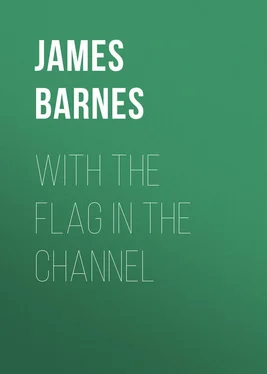James Barnes - With The Flag In The Channel
Здесь есть возможность читать онлайн «James Barnes - With The Flag In The Channel» — ознакомительный отрывок электронной книги совершенно бесплатно, а после прочтения отрывка купить полную версию. В некоторых случаях можно слушать аудио, скачать через торрент в формате fb2 и присутствует краткое содержание. Жанр: foreign_antique, foreign_prose, на английском языке. Описание произведения, (предисловие) а так же отзывы посетителей доступны на портале библиотеки ЛибКат.
- Название:With The Flag In The Channel
- Автор:
- Жанр:
- Год:неизвестен
- ISBN:нет данных
- Рейтинг книги:3 / 5. Голосов: 1
-
Избранное:Добавить в избранное
- Отзывы:
-
Ваша оценка:
- 60
- 1
- 2
- 3
- 4
- 5
With The Flag In The Channel: краткое содержание, описание и аннотация
Предлагаем к чтению аннотацию, описание, краткое содержание или предисловие (зависит от того, что написал сам автор книги «With The Flag In The Channel»). Если вы не нашли необходимую информацию о книге — напишите в комментариях, мы постараемся отыскать её.
With The Flag In The Channel — читать онлайн ознакомительный отрывок
Ниже представлен текст книги, разбитый по страницам. Система сохранения места последней прочитанной страницы, позволяет с удобством читать онлайн бесплатно книгу «With The Flag In The Channel», без необходимости каждый раз заново искать на чём Вы остановились. Поставьте закладку, и сможете в любой момент перейти на страницу, на которой закончили чтение.
Интервал:
Закладка:
Still, in his sailing orders, nothing had been said about the taking of prizes. He had merely been ordered to get safely in to some Dutch port and bring out as soon as possible a miscellaneous cargo of such materials and supplies as merchants could dispose of most readily to the fighting branch of the revolted colonies.
All was plain sailing, with pleasant breezes, until at the end of the twenty-third day after leaving the capes. Then a storm sprang up with high winds, and the tumbling, rolling seas that mark the edge of the Bay of Biscay, and there the Charming Peggy proved to be a disappointment. Safe enough she was, but she butted and jumped and turned like a tub in a mill-race. She acted like a bewitched and bewildered creature, and in order to prevent having to run for it, Captain Conyngham had recourse to an expedient often used in vessels of light tonnage. He rigged out a sea-anchor, and for three days the observations showed that the Peggy’s position was about stationary. On the fourth day the weather cleared a bit, the wind shifted, and twenty-four hours’ good sailing to the northward brought her in sight of the English coast. The wind holding fair, she entered King George’s private channel with all light canvas flying, and everything seeming to promise well for the future. Numerous sail had been sighted on either hand, but Captain Conyngham kept well to the eastward, close in to the low-lying French coast. Clumsy fishing craft and trading vessels had been passed near at hand, but not a sign of a man-of-war, or anything to give the slightest concern as to the safety of the Charming Peggy. But late in the afternoon of the second day, after the clearing away of the storm, there appeared, bowling along, and holding such a course as would bring her soon within hailing distance, a jaunty single-masted vessel that needed no second glance to determine her class and quality.
Captain Conyngham knew her to be one of the fast king’s cutters long before he had looked at her through the glass, but he held his own course as if unconcerned, and now the expected resort to strategy was necessary. At his orders the Dutch flag had been shown, and the cutter, although coming nearer and nearer, showed apparently no signs of suspicion. The watch on deck lolled over the rail, glancing from the approaching vessel to their young skipper, who like themselves was leaning over the side puffing a cloud of smoke from a long clay pipe. Occasionally, however, he would give an order to the helmsman that was obeyed, and it was seen that almost imperceptibly the brig was edging up nearer the wind, and that the approaching cutter, that was sailing close hauled also, would pass astern of her.
The captain turned for an instant, from measuring the lessening distance between the two vessels, to see how the crew were taking it, for any untoward action now might attract the other’s attention. Captain Conyngham could not make up his mind at first as to whether she intended hailing him or not, and still in doubt, he spoke to the first mate, a lean New Englander, who sat on the edge of the cabin transom, smilingly addressing him.
“Mr. Jarvis, I wonder which of us speaks the best Dutch?” he half queried. “If that fellow yonder intends to hail us, we’ve got to get an answer ready. I’m pretty good on Spanish, and I can ‘parlez-vous’ after a fashion, but Dutch has been Dutch to me. We should have flown the Spanish flag, but it’s too late now, bad luck to it.”
“Wa-al,” the Yankee answered, “I’m thinkin’ if we just squeeze her the least bit more she’ll be at jus’ such a distance that y’u couldn’t make nothin’ out through a speakin’-trumpet, and Dutch is Dutch to most Englishmen anyhow.”
By this time the figures on board the approaching cutter could be plainly seen. On the quarter-deck there were two officers standing together, while forward the crew lay bunched together, sheltering, behind the low bulwarks, from the spray that dashed over her bows. Again Captain Conyngham looked at his own crew standing in the waist. Talking together were the two sailormen who had had the mark upon them of the royal service. One, Captain Conyngham had suspected from the very first of being a deserter from one of the English ships that had touched at an American port. His name – Higgins – also might have gone to strengthen his suspicion, and he had a little Devonshire twist in his speech. The other, a shorter man, with light blue eyes, was a compatriot of the young captain; he had a broad stretch of upper lip, and the strong brogue of the west coast.
Conyngham’s eye fell upon these two as they stood there and suddenly he started. They were whispering almost beneath their breath. Strange to say the supposed deserter showed no signs of the fear that the occasion might have demanded; yet he was a trifle nervous, for his fingers hitched at the lanyard of his clasp-knife.
“Higgins,” cried Captain Conyngham suddenly, “below with you and fetch me one of the broadaxes from the carpenter’s chest. And stay,” he said; “bring me up a dozen nails, two of each kind. Sort them out carefully and make no mistake about it.”
The man hesitated.
“Below with you there,” the captain repeated, half fiercely, “and no questions.”
Reluctantly the tall sailor went down the forward hatchway.
“McCarthy,” called Captain Conyngham again, “go to my cabin and tell the boy to send me up my trumpet, and stay below until I send for you.”
The other men had listened to these orders in some astonishment. Even the first mate had cast an inquiring glance at the captain, but had said nothing.
In a few minutes the boy appeared with the speaking-trumpet. Captain Conyngham took it and held it out of sight beneath his coat.
The position of the English cutter was now a little abaft the beam of the Charming Peggy, but she was dropping farther and farther astern with every foot of sailing.
Suddenly across the water there was a hail. “Heave to, I want to speak to you,” came plainly and distinctly.
The captain, after his sudden orders to the sailors, had resumed smoking. Now he took the long pipe from his mouth and leaning forward placed his hand behind his ear as if he had not understood.
Again the hail was repeated. This time the captain waved his hand denoting complete understanding. Then he turned as if he was giving some orders aloud to the crew, but instead he told the steersman to luff a little, and spoke quietly to the first mate:
“Two minutes more and we’ll be out of it, Mr. Jarvis,” he said; “she will never fire at us.”
The cutter still held on, and was by this time well astern. The officer who had hailed was standing with his companion expectantly leaning against the shrouds.
Conyngham whipped the trumpet from under his coat, as if it had just been handed him, and bellowed something back over the taffrail. Then he waved his hand cheerfully and went on smoking his pipe.
The two men on the English vessel were evidently perplexed. But the Charming Peggy, now having gone back to her course again, and having the weather-gage, was rapidly leaving. At last, as if her suspicion had been satisfied, the cutter wore, let go her sheets, and went off free to the southeast.
The men on the Charming Peggy were all in a broad grin, and Mr. Jarvis was almost hugging himself in sheer delight and relief.
“I thought you spoke no Dutch, sir,” he said, laughing. “What was it you said to him?”
“I haven’t the slightest idea,” was Conyngham’s rejoinder, “but I think it had some Irish in it.”
He did not appear amused, however, and a moment or two later he stopped suddenly in the pacing that he had taken up again. With a stern look on his face he ordered that the two men he had told to go below should be sent up to him at once.
Читать дальшеИнтервал:
Закладка:
Похожие книги на «With The Flag In The Channel»
Представляем Вашему вниманию похожие книги на «With The Flag In The Channel» списком для выбора. Мы отобрали схожую по названию и смыслу литературу в надежде предоставить читателям больше вариантов отыскать новые, интересные, ещё непрочитанные произведения.
Обсуждение, отзывы о книге «With The Flag In The Channel» и просто собственные мнения читателей. Оставьте ваши комментарии, напишите, что Вы думаете о произведении, его смысле или главных героях. Укажите что конкретно понравилось, а что нет, и почему Вы так считаете.












